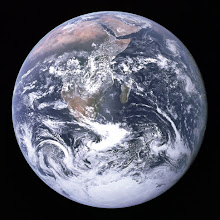This issue typifies one of the basics of general systems theory: disruptions in one part of the system create reverberations in other parts of the system. Events of the past few months in Pacific Ocean follow this sequence, roughly: first, there was the earthquake off the coast of Japan; second, the subsequent tsunami which hit Japan caused massive destruction on land, in terms of the built environment; third, the receding waters from the tsunami dragged out an estimated 20 million tons of debris off Japan's coast; fourth, that debris is now afloat, and caught with the Pacific currents, headed toward Hawaii, and eventually the West Coast of the US; sixth, that "island of debris" will likely affect a wide range of other activities, spanning from animal migration to shipping to surfing to other as-yet-unknown events.
Indeed, it seems we now live in very interesting times. The dual "crowding effect" of significant human population increases multiplied by increased levels of energy intensity (and the creation of the technology that goes along with that) has enabled humans to generate enormous metabolic processes, at the social level. Those large-scale metabolic processes (often referred to as "the metabolism of society"), in turn, can generate correspondingly enormous waste streams. The predominance of "econometric modelling" linked to narrow time horizons, themselves rooted in the philosophy of short-term profit maximization, has contributed to the present predicament. Add to that the disruptive effects of earthquakes and tsunamis, and you have a recipe for the garbage monster now floating in the Pacific Ocean. Indeed, the notion of monsters rising up out of the seas is a very ancient, archetypal motif.
The Godzilla franchise is but a modern version of the classic sea monster motif. The above clip (in Japanese voice-over, but filmed in New York City) is from the 1998 version. A few things are worth noting here. Typically, in classical mythology, the gods would unleash such creatures as a punishment for the wrongs done by human beings in relation to other aspects of their environment or their world ("the gods must be angry!").
Large bodies of water (and especially the ocean) are often representational of the human subconscious, as well as the primordial beginnings of the human race; therefore, out of our subconscious a monster is manifest. That monster was/is, in many ways the product or spawn of our blind ambitions and our technical/mechanical creativity. That monster, once unleashed into the conscious realm, can be highly destructive to human endeavor and hard to contain. This, I think, is in many ways representational of our current reality: Wall Street's position in this movie is interesting. Here, the virtual "Ground Zero" (pun intended) of our blind ambition and greed gets its own comeuppance, as a result.
We (those of us who like the "disaster movie" genre) seem to relish in the virtual destruction of some of our most cherished institutions and edifices, as if such scenes of destruction really do feed something in our collective subconscious. [Q: How many LA-based disaster flicks have not resulted in the destruction of the Capitol Records building? Think about it.] It is a brief chance to experience a small, "take-home slice" of the classic notion of "the ecstasy of the apocalypse," minus the cuts and abrasions. I suspect there is the seed of a little Godzilla in all of us, just waiting for the right conditions to appear.
In the final analysis, the garbage monster now afloat in the Pacific Ocean is our own Godzilla. Unlike the Godzilla in the movies, this one is very slow moving, comparatively; but it will probably be no less destructive.
Blaine









No comments:
Post a Comment